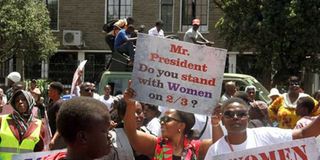Are we ready for #MeToo campaign?

Women protesting outside Parliament in Nairobi. Women continue to share their personal experiences on harassment and sexual assault using the hashtag #MeToo. PHOTO | MARTIN MUKANGU | NATION MEDIA GROUP
What you need to know:
- Some of the notable ones include Hollywood actresses Alyssa Milano and Rose McGowan.
- Recently, Prince Harry and his wife Meghan also spoke boldly for “Me too”.
- We also need more positive male and female role models.
In the past year, millions of women in the United States and across the world have broken their silence to speak up about harassment and sexual assault against women.
Women continue to share their personal experiences on harassment and sexual assault using the hashtag #MeToo.
Some of the notable ones include Hollywood actresses Alyssa Milano and Rose McGowan, known for their roles in the 2000s TV show Charmed.
McGowan is also the whistle-blower to Hollywood producer Harvey Weinstein, who was accused of sexual harassment and assault by dozens of women, including Oscar Award-winning Kenyan actress Lupita Nyong’o. Actor Bill Cosby has also been indicted for sexual assault in the ’80s.
Recently, Prince Harry and his wife Meghan also spoke boldly for “Me too”.
In the wake of women’s socio-economic advancement and progress, Kenyans should understand what the #MeToo movement stands for, how men can be part of it and, more importantly, how we can make our community safer and better for our men, women and children.
GREY AREAS
But there are several grey areas around understanding harassment versus assault, particularly at the workplace and in a societal context.
Harassment occurs almost on a daily basis and is sometimes considered harmless by many men and women. It is the unwelcome advances of a person of one gender towards the other, usually in a professional setting like the workplace.
Typically making sexual remarks and comments out loud towards an individual, or other such suggestions and comments, is harassment.
Escalating that to physical action then constitutes abuse or assault.
#MeToo has been incorrectly perceived in both the West and Africa as a defamation agenda against men. Many men believe it is a ‘man-hating’ campaign by discontented women targeting primarily high-profile men to extort from them.
Others perceive it as an attempt by the women’s movement and feminists to emasculate men. At the local level, there is sheer oblivion on #MeToo as it is perceived as a ‘Western problem’.
CULTURAL DISCONTENT
In many African societies, there is a cultural disconnect. We have young women who, unfortunately, fall into a clandestine lifestyle, targeting and economically depending on men either voluntarily or involuntarily. Explanations for this include absence of a father figure, social pressures and, many a time, a result of childhood abuse.
Conversely, others grow up economically empowered and demanding equal respect to men as their peers, particularly at the workplace.
Tarana Burke initiated #MeToo in the 1990s targeting women in historically under-represented African-American communities. Unfortunately, it did not take off globally — until it was highlighted by high-profile actress Alyssa Milano and millions of women began posting their personal experiences online using the hashtag #MeToo.
In Kenya, we have read or heard of high-profile figures accused of sexual assault against women. Sadly, our society labels women with these experiences and, with increased stigma against feminism and the women’s movement, there is a general apathy towards the cause.
DEBUNK MYTHS
All the myths need to be debunked for women to understand their position in society with men supporting this important role.
In many Western and African societies, the judicial system is dominated by men and a select few women.
Moreover, older women are usually more accustomed to assault and abuse as they were not raised to fully comprehend their rights as women, due to our historically misogynistic cultural context.
There is, typically, a blame mentality that points the finger at the woman, regardless of the situation. Young women have a significant disadvantage, lacking a support system that understands their dilemma even as systemic and cultural barriers negate their experiences.
Our curriculum doesn’t have an avenue for youth to be educated on awareness. This in a country that endorses polygamy and encourages cultural practices that make it challenging to demarcate welcome and forcible advances.
How can men chip in? A good starting point is in education and awareness — such as mandatory workshops at the workplace, teaching young boys to respect women and educating girls on the importance of self-confidence, self-esteem and empowerment.
We also need more positive male and female role models.
Ms Kazungu is a PhD candidate in political science at the University of Tennessee, USA. [email protected]





